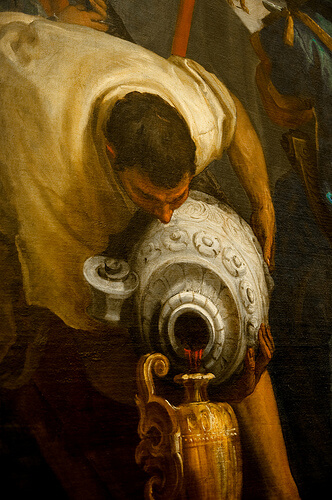
John 2:1-11
You probably know this story. It is often cited as the first of Jesus’ many miracles, and we hear it mentioned at wedding ceremonies. It’s the story about wedding guests who drank up all the wine and about how Jesus supernaturally changed water into the joy juice of God’s Kingdom.
But I must tell you that there was something about this miracle story that bothered me the first time I heard it. It happened as I eagerly watched my Sunday School teacher spread out brightly colored pieces of felt on her flannel graph. Why didn’t Jesus cut out the middle men, I wondered? Why did Jesus have to involve servants filling pots of water to perform the miracle of making wedding guests happy?
I had the child-like faith to know and believe that Jesus could have waved His hand, or spoken just a commanding word, and presto-chango, there would instantaneously been enough wine to fill tanker trucks. However, Jesus goes about His very first miracle, not solo, but by involving others. He dispatches the household servants on what had to be repeated trips to a cistern or well.
Having myself, as a boy, hauled water to our sheep on the farm, I had an idea that filling water jars meant a lot of work for the servants. My Sunday School teacher carefully explained how each of the stone jars held 20-30 gallons, which meant that the servants would have hauled 120 to 180 gallons in all. And that would have taken quite a lot of time as upset wedding guests waited for more wine. So I was bothered as to why Jesus in His very first miracle involved other people. Why did He ask others to help Him?
I still wonder today why Jesus doesn’t simply wave His hand, or speak a word, in order to bring relief to those suffering in tornado blitzed Oklahoma? Or, why won’t Jesus dispatch a few of His legions of angels to Outer Mongolia to tell the people the Good News about Him? And why won’t Jesus send the Holy Spirit to buck up my discouraged neighbor? It sure seems a lot quicker, and a lot more effective to cut out the middle men and women, and for Jesus to do it Himself.
This question about why the middle man reminds me of a question once put to the French mathematician, philosopher, and theologian, Blaise Pascal (1623-1662). When asked why a sovereign, all-powerful God would require or command prayer, Pascal replied: “God instituted prayer in order to lend to His creatures the dignity of causality”. God bestows on those creatures bearing His Divine image the “dignity” of causing things, the dignity of making a difference in God’s world.
That means that we really do count in God’s cosmic scheme; we can cause things to happen that last for eternity. The Lord makes us “co-workers together with God” (I Corinthians 3:9). He bestows on His children the majesty, the dignity, the glory of making things happen together with Him. The little boy who gave his whole lunch of five loaves and two fish to Jesus became a co-worker with Jesus in the miracle of feeding a multitude (John 6:9). God lends to people the dignity of causality by choosing to do some things only through them. God makes you and me count!
Four centuries before Pascal pointed out the “dignity of causality”, Thomas Aquinas (1225-1274) sounded a similar theme in his Summa Theologiae writing: “Divine providence works through intermediaries. For God governs the lower through the higher, not from any impotence on his part, but from the abundance of his goodness imparting to creatures the dignity of causing” [emphasis added]. It was not from any impotence on Jesus’ part that He involved servants in His first miracle, but it was the abundance of His goodness in wanting to give them a part in something eternal.
As a parent, as well as a grandparent, I know the delight of looking at something I made with kids, or did with them, and saying: “Look at what we did!” “Hooray, we did it!” If I understand the Bible rightly, then I think one of the joys of heaven will be Abba Father proudly pointing out what we did together with Him and saying: “Look at what we did!” “Hooray!”
Yes, Lord! Look at what we are doing together! It is the dignity of causality, the dignity of working together with You, for that which is lasting, for that which will never fade away.
REFLECTION
- Take a few moments to prayerfully reflect on your life. Reflect on those times that you have sensed that you were working together with God; those times you felt God was doing His work through you. What do you want to say to God about that?
- Do you sense something God wants to do through you now? In what ways do you think God might be prompting you to be like the little boy giving his whole lunch to Jesus, or like the household servants hauling water for Jesus, without really understanding why? What do you want to say to God about this?
Grace and peace,
Tim
photo by Tybo


